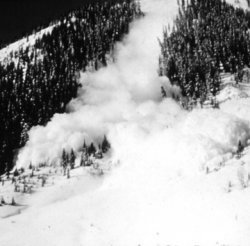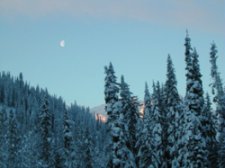Steep, Deep and Deadly

"The white wave." That's what it's called in the back-country. Heavy new snow falling on older snow, strong winds and changing temperatures are conditions favorable to avalanches. And when an unstable bond between layers is impacted by extra force -- weight, movement or sound -- there is little someone can do if caught in its path. Miraculously, though, many have survived, thanks to luck, skill or simply being rescued before they suffocate. The following story, reprinted with permission of the Portland Oregonian, tells how one CC grad survived the slide of his life.
Story by STEVE DUIN of the Portland Oregonian, photos provided by the Colorado Avalanche Center
The best Scott Lewis '81 can tell, his buddy Andrew Dumke '82 started the avalanche that swept him away.
Lewis didn't have much warning. As he skied into a pristine bowl of open powder high above the Bell Irvine River in northern British Columbia, he heard someone above him holler, which only added to his exhilaration. "I thought they were hooting at the great conditions," Lewis said.
He never heard the snow gaining on him. One moment, the powder was grabbing at his knees and pushing him toward a tree; the next, he was slammed in the back by what felt like a runaway refrigerator.
Scott Lewis is 39 and has been skiing since the age of 7. Through the years, he's been schooled in avalanche awareness, so he knew enough -- just enough -- to let go of his poles and begin the swimming motion designed to keep him atop the white wave.
And it worked. For about three seconds.
The next thing Lewis knew, he was immobile in the grip of a cold dark fist. Trapped in the 3 inches between his hands and his face was all the air he had left. When he tried to move his wrists out to expand that space, he jarred loose enough snow to cover his mouth.
************
The avalanche was kinder to Andrew Dumke, the skier who gave it life. The snow gave him a quick E-ticket ride, then allowed him to slip away while it went after his friend of 20 years.
The conditions, Dumke realizes now, were ideal for the snowslide. Two feet of snow lay atop a layer of hoarfrost. When he skied into the top of the bowl, the slab of snow gave way.
"The hoarfrost acts as ball bearings," said Dumke, who went to Colorado College with Lewis and once dated his sister. "The slab carried me about 40 feet, then the snow went out from under me."
He remembers seeing his friend, who'd entered the bowl much lower, 300 feet below him, headed for a tree. But he wasn't worried when he rejoined Bill Mooz '81 -- another college friend -- and the heli-ski guide, even when he realized Lewis was missing.
"I was in denial," Dumke said. "I was thinking he'd turn up."
When the group radioed up to the helicopter that there'd been an avalanche and a skier was lost, the reaction was quite different. Neil Cannon, the pilot who was bringing the next group of heli-skiers up through the clouds, immediately punched his stopwatch.
And as soon as the helicopter touched down at 6,000 feet, guide Joselyn Lang raced down the hill to the burial ground. "She's the real hero in this," Dumke said. "She skied straight down the avalanche trail with her transponder."
She had a sense of urgency. She had a memory. "She was guiding 10 years ago when she was one of a dozen people caught in an avalanche," Lewis said. "She dug herself out and rescued two others. The other nine perished."
************
In this uncharted region, life becomes totally different from the day-to-day existence one has grown accustomed to. The climber has to do something or expire. There is no audience, no roar of the crowd, just a broken climber with a whole new reality. -- Peter Poterfield, "In the Zone: Epic Survival Stories from the Mountaineering World"
He didn't see a blue light, much less a light at the end of the tunnel. "And I wasn't hovering over the whole thing," Lewis said. "The event happened so fast that if I was scared, it was buried under reacting to it all."
After using a single finger to remove the snow from his mouth, Lewis took stock. He couldn't move, but as claustrophobia has never haunted him, he didn't panic.
"I knew very clearly I could die right there," Lewis said. He thought of his young wife, Laura, and his two young sons, Zachery and Elliott, and all they had left to do together. "I made a very conscious determination that if I were to die, it would not be for lack of a will to survive."
Because he perceived a faint light through the snow, Lewis thought he might be buried under only several inches of Mount Hood-style cement. "I started yelling as loud as I could," he said. When he stopped. He realized he was panting...and he might be using up all the oxygen he had left.
"That's the last thing I remember."
************
Four feet above Lewis, there was pandemonium, Dumke said. It took several minutes for Joselyn Lang to get everyone's transponder turned to receive so they could home in on the unit strapped to Lewis. It took several more for a third group of skiers to arrive with extra shovels.
"At the 15-minute mark, I was convinced he was dead, probably with a great deal of trauma," said Dumke, who works for a venture capital firm in the Bay Area. "He was two feet from a tree when we finally probed him. The material he was buried in was quite hard. He wasn't just buried, he was entombed.
"We dug like madmen to get down to him."
It took almost eight minutes of digging to reach Lewis. He thinks he remembers the first shovel grazing his cheek and saying, "Hey, careful, that's my face." Dumke remembers him moaning: "He didnít just snap out of it. We didn't know for several minutes if he was all right."
When Lewis began babbling, "I am so lucky, I am so happy to see you guys," Neil Cannon turned off his stopwatch. It read 28 minutes. Lewis had been buried in packed snow for almost 25 of them. One of the guides said he's seen quite a few people dug out of an avalanche and this was the first who'd come out alive.
Within 15 minutes, the helicopter had carried Lewis down to the Bell II Lodge. He was in the hot tub, sipping his third cup of tea, when he realized he was still shivering.
************

They skied again the next day, the bunch of them.
"It wasn't an easy decision to go back," said Lewis, who lives in Northwest Portland and works for Conversa, a computer firm out of Redmond, Wash. He hadn't even called Laura yet to tell her what happened. "If something did happen to me after this, I thought, if I went down a crevasse or got eaten by a moose, I'd feel ridiculous."
They skied on flatter, calmer ground. "By the end of the day," Lewis said, "I felt I'd done what I needed to do. Now it was time to go see my little boys and my wife."
Because everyone in the group had paid $4,000 for an entire week of skiing, Dumke stayed in British Columbia for the last five days. "After Scott left, there was an avalanche almost every day," Dumke said. "That was the stressful part. It wasn't easy to blow off anymore. You started evaluating the risk. Is this living or is this living stupidly?"
All the while, Dumke was reading Stephen Ambrose's book on D-Day. Ambrose, he said, described the different ways soldiers reacted to the threat of death. "The new soldiers denied it: 'It's not going to happen to me,' Dumke said. "A second group said, 'It could happen to me, I could be killed, but if I'm a better soldier, digging better foxholes, I won't be.' The third group said, 'It will happen to me, and the only solution is to get out of here.'"
If you transpose those mind-sets to the top of a mountain near the Yukon Territory, Dumke had by week's end transferred from the second group to the third. "I wanted to get out of there," he said.
The same month the CC group survived the slide in Canada, two avalanches killed 33 in the Austrian Alps. Lewis is since confronting a lot of different feelings. He tears up unexpectedly. He hugs his sons a little more often. He has, suddenly, no tolerance for wasted time.
He knows he was lucky. He survived being buried in a blind wall of snow. He saw death sail by, and nothing was as terrifying as how capriciously mundane it seemed.
Now he finds something extraordinary in every breath he takes.
"You know when you play pinball," Lewis said, "and the numbers match up? You get that extra ball? I'm on my extra ball."
Click here to read about another avalanche survivor.
Click here to read about the legacy left by another CC alumn.
Back to Index